Reviews
Erich von Stroheim
USA, 1922
Credits
Review by Cullen Gallagher
Posted on 27 August 2009
Source Kino DVD
Categories Oh, the Depravity! The Cinema of Erich von Stroheim
Foolish Wives is less a comedy than a mockery, taking as its targets the moral underpinnings of society; the sanctity of marriage; love’s purity; masculinity; femininity; and, of course, the aristocratic elite. A cursory glance at von Stroheim’s filmography reveals these as reoccurring preoccupations: compulsive concerns that the director never tired of holding a mirror up to and revealing the hypocrisy that lay beneath a virtuous façade. Von Stroheim’s laughter is sadistic. He derives pleasure from exposing the fraudulent virtues of others, even though he, more than anyone, is complicit in the widespread corruption.
Masquerading as Count Wladislaw Sergius Karamzin, von Stroheim is the epicenter of immorality. Posing as Russian aristocrats, he and his partners-in-crime — “cousins” Olga and Vera Petchnikoff — take up residence in a waterfront villa in Monte Carlo, gambling away counterfeit bills in the casino while waiting for the “big score” that will set them on easy street. Until that happens, Sergius sets his sights on Helen Hughes, whose husband, an American diplomat, is too busy with business to even notice her.
If this triangle scenario sounds familiar, it is because it bears many similarities to von Stroheim’s first film, Blind Husbands, in which he also played a lecherous villain who lures away a dissatisfied wife from her neglectful spouse. Where Foolish Wives differs from its predecessor is with von Stroheim’s character, which is not only much more complex, but far more odious. No longer a whimsical tempter, his character here plots his designs to exploit those around him and coldly carries his plans out. Sergius takes Helen out on a walk, knowing well in advance they will get caught in a torrential storm, in order that they are forced to take shelter together in a small shack where he can have his way with her. Nor do his “conquests” end with Helen: he also lures the mentally challenged daughter of his counterfeiter with generous wafts of his cologne, and convinces his own maid, Maruschka (Dale Fuller, a von Stroheim regular who also lent her dramatic eyes to Merry-Go-Round, Greed, The Merry Widow, and The Wedding March), to give up her whole life savings under false promises of marriage. Following Serguis through every one of his tricks, Foolish Wives feels like Little Red Riding Hood but told from the perspective of the wolf: we clearly know who the victim is, but the villain is far more interesting. We watch in anticipation a moment of revelation, or some moral turnaround, for Sergius — something to make him worthy of our emotional investment (or to justify our interest in someone we should be repelled by but are not). Von Stroheim, however, keeps us waiting, as no such redemption ever befalls Sergius.
Von Stroheim is notorious for his troubled production histories, inflated budgets, and intrusive, ruinous edits mandated by studios and censors. Foolish Wives is no exception. Richard Kozarski details these incidents extensively in his study on the director, The Man You Loved To Hate: Erich von Stroheim and Hollywood. Instead of merely copying and citing his illuminating research, I will call attention to the most characteristic dilemma when dealing with von Stroheim: the problem of authorship. With the shooting schedule lasting nearly a year, a principle character (Rudolph Christians, who played Mr. Hughes) dying midway through filming, and the budget mushrooming from $250,000 to an alleged $1,124, 498, it’s no wonder Universal Studios had high hopes for the picture: they needed to recoup its costly investment that was heavy on both time and money.1 Even the version shown at its premiere, which was three and a half hours long, was but an inkling of even longer version that von Stroheim had intended. Studios and censors continued to bite at the film, cutting it down to a version that no audience could swallow. “Critics and audiences alike sensed the gaps in plot and characterization,” writes Kozarski, “and reacted with impatience and boredom… [The] film grossed only $869, 285, [which] was not even enough to cover the negative costs, much less prints and advertising.”2 In a business in which money talks, even at such an early point in his career von Stroheim was already speaking the wrong language.
It was Arthur Lennig who decades later combined various American and European cuts of Foolish Wives to make a fuller, though not complete, version. Though, as Kozarski notes, a comparison of the varying releases revealed interesting, if problematic, differences: “Foreign versions were not prepared from the same negative as domestic versions. Sometimes the negatives were taken simultaneously, with two cameras side by side. At other times the foreign negative represented an entirely different take.”3 What to make so such divergences? Not only does it raise the possibility of audiences in different countries having seen different cuts, but severely diminishes the prospect of ever agreeing on a definitive cut of Foolish Wives. Unfortunately, such uncertainties plague almost all of von Stroheim’s work, and are just another hurdle for audiences and scholars to negotiate when considering his work. In the end, what remains is a coherent work unified by its global immorality and ritualistically debased virtue, all centered around von Stroheim’s strong, nefarious presence that is unmistakable and immutable.
- Richard Kozarski, The Man You Loved to Hate: Erich von Stroheim and Hollywood (Oxford: Oxford U.P., 1983) 77-78.
- Kozarski, 88.
- Kozarski, 298.
More Oh, the Depravity! The Cinema of Erich von Stroheim
-
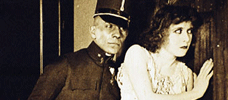
Blind Husbands
1919 -
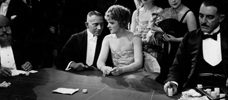
Foolish Wives
1922 -
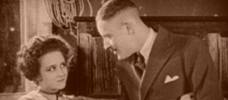
Merry-Go-Round
1923 -
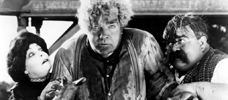
Greed
1924 -
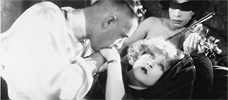
The Merry Widow
1925 -

The Wedding March
1928 -

Queen Kelly
1929 -
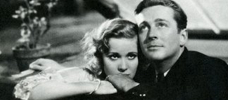
Hello, Sister!
1933
We don’t do comments anymore, but you may contact us here or find us on Twitter or Facebook.



